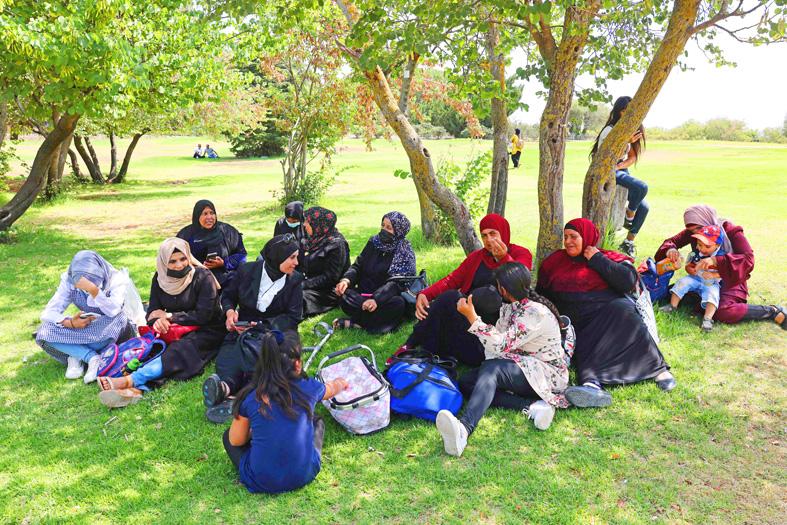A ban in force since 2003 on Arab citizens and residents of Israel extending their rights to their Palestinian spouses came to an end yesterday after lawmakers failed to extend the controversial measure.
Israeli Prime Minister Naftali Bennett’s request to prolong the ban had divided his disparate coalition, with both Jewish left-wingers and Arab conservatives strongly opposed.
In a vote early yesterday, parliament tied 59 votes to 59, meaning the measure lapsed.

Photo: AFP
The outcome underlined the wafer-thin majority Bennett’s coalition commands in the 120-seat parliament. The eight parties in the coalition were united by little but their shared enmity to opposition leader Benjamin Netanyahu, whom they unseated as prime minister last month after a record 12 straight years in power.
The ban first enacted during the second Palestinian intifada, or uprising, had been justified by supporters on security grounds, but critics derided it as a discriminatory measure targeting Israel’s Arab minority. It has caused endless complications for Palestinians living across Israel and the territories it has occupied since 1967. A substantial number of those affected live in annexed east Jerusalem and therefore have Israeli residency, without necessarily being citizens of the Jewish state.
In a protest against the measure outside parliament on Monday, some recounted the hardships of seeking permits to join their spouses, or the risks of entering Israeli territory without permission.
Ali Meteb said his wife not having Israeli residency rights had confined his family to a “continuous prison.”
“I am asking for rights that the state owes us ... for my wife to have Israeli ID, residency rights and freedom of movement,” he said.
Jessica Montell, head of Hamoked, an Israeli human rights group that provides legal services to Palestinians, said “tens of thousands of families are harmed by this law.”

Chinese President Xi Jinping (習近平) is to visit Russia next month for a summit of the BRICS bloc of developing economies, Chinese Minister of Foreign Affairs Wang Yi (王毅) said on Thursday, a move that comes as Moscow and Beijing seek to counter the West’s global influence. Xi’s visit to Russia would be his second since the Kremlin sent troops into Ukraine in February 2022. China claims to take a neutral position in the conflict, but it has backed the Kremlin’s contentions that Russia’s action was provoked by the West, and it continues to supply key components needed by Moscow for

Japan scrambled fighter jets after Russian aircraft flew around the archipelago for the first time in five years, Tokyo said yesterday. From Thursday morning to afternoon, the Russian Tu-142 aircraft flew from the sea between Japan and South Korea toward the southern Okinawa region, the Japanese Ministry of Defense said in a statement. They then traveled north over the Pacific Ocean and finished their journey off the northern island of Hokkaido, it added. The planes did not enter Japanese airspace, but flew over an area subject to a territorial dispute between Japan and Russia, a ministry official said. “In response, we mobilized Air Self-Defense

CRITICISM: ‘One has to choose the lesser of two evils,’ Pope Francis said, as he criticized Trump’s anti-immigrant policies and Harris’ pro-choice position Pope Francis on Friday accused both former US president Donald Trump and US Vice President Kamala Harris of being “against life” as he returned to Rome from a 12-day tour of the Asia-Pacific region. The 87-year-old pontiff’s comments on the US presidential hopefuls came as he defied health concerns to connect with believers from the jungle of Papua New Guinea to the skyscrapers of Singapore. It was Francis’ longest trip in duration and distance since becoming head of the world’s nearly 1.4 billion Roman Catholics more than 11 years ago. Despite the marathon visit, he held a long and spirited

The pitch is a classic: A young celebrity with no climbing experience spends a year in hard training and scales Mount Everest, succeeding against some — if not all — odds. French YouTuber Ines Benazzouz, known as Inoxtag, brought the story to life with a two-hour-plus documentary about his year preparing for the ultimate challenge. The film, titled Kaizen, proved a smash hit on its release last weekend. Young fans queued around the block to get into a preview screening in Paris, with Inoxtag’s management on Monday saying the film had smashed the box office record for a special cinema